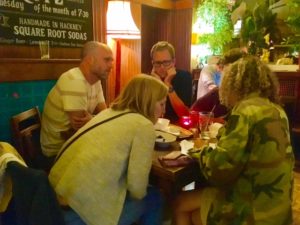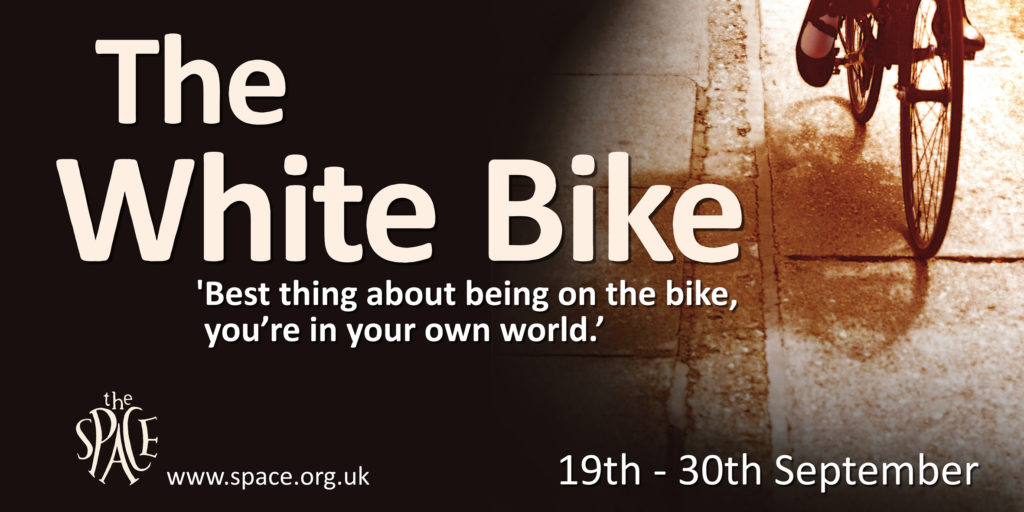Taking her show ‘The White Bike’ to stage proved a difficult task for playwright Tamara von Werthern after it was rejected for ACE funding. In this guest post she discusses the challenges she faced and how still dealt with them, ensuring the show would go on!
I got the email from the Arts Council (ACE) and my heart was pounding. We had been working so hard to make this production of my play The White Bike happen. Now everything depended on one email.
Inspired by the true story of Eilidh Cairns who was crushed by a tipper lorry in 2009, the play follows a young mother on her journey by bike through Hackney.
My own journey towards this production had started when I cycled past the crash site after returning to work from my maternity leave. As a cyclist and young mother I felt vulnerable in traffic, and my natural reaction was to write about my fears and concerns.
I was lucky to be invited by the Arcola Writers Group to develop my thoughts into a short play under Duncan Macmillan. The piece was then showcased at the Arcola Theatre in 2010, directed by Caroline Leslie.
But that was just the beginning. We were now on the brink of a full professional production with an amazing creative team, an exciting cast and a new full-length script, developed over years of workshops, and Research and Development. We also had help through my own involvement in campaigning for safer roads and from interviewees who had been affected by road violence.
It is hard to make a production happen – finding the right people, convincing a venue, getting funding. I was lucky that I had met director Lily McLeish two years previously, who was equally passionate about the importance of the play and deeply committed to seeing it on stage. (If you want to read more about the early development of The White Bike, click here.)
After securing The Space as our venue and working on all aspects of our production for many months, we had now raised a phenomenal £4,313 via Kickstarter.

But support also came in other forms, including donated rehearsal space and even getting safer cycling charities and independent bike shops on board. There was now a real buzz around the project, and we felt that if everyone else was behind it, the ACE just had to support it too. I clicked on the email. My eyes flew over the page.
And there it was.
Our application had not been successful.
I felt numb.
We had had ACE funding for our Research & Development week and had a committed and brilliant team on board. We had 130 supporters who had given money towards this, our venue was booked, and we even had a publishing deal.
It felt as if the rug was pulled out from under us at this crucial moment, when everything was going so well. Ironically, the main reason why the application was rejected was that at the time of applying we didn’t have enough money already confirmed, though now we did.
The worst thing was that we had no time to reapply. It takes three months for a grant application of over £15,000 to be considered, and it was now the end of July. The show would open on 19 September.
Sadly setbacks are an inevitable apart of the theatre industry – it’s about what you do next that matters.
Back to the drawing board
A few phone calls later I felt a bit better. The director, producer and I were equally gutted but we set up a few emergency meetings straight away to consider our options. We drew up a new budget, cutting away as much as we could and trying to safeguard the money needed to pay our team and cast. We cut rehearsal time down and decided on parts of the process we could each take on ourselves.
In the end we had something to work with. We still had to raise money to make it happen, but, with a bit of luck, it was achievable.
Raising money
It took a whole day to phone up financial headquarters to find out if they had a social responsibility scheme, which is when financial institutions have a goal to support the community they are rooted in.
As The Space is just across the river from Canary Wharf, we thought it might be feasible that the companies situated in our neighbourhood might help us out financially. In return we could offer advertising in our published script or even workshops on physical theatre in a corporate environment.
Unfortunately, it turned out that most banks only support community projects which include financial education, and unfortunately not the arts.
We also applied to trusts and foundations, including The Paul Hamlyn Foundation, the Esmee Fairbank Foundation and the Royal Victoria Hall Foundation, amongst many others. For some of these you need charitable status, which we have through co-producing the play together with The Space.
We wrote to Hackney Council, where the play is set, and to Tower Hamlets, where both the production and rehearsals (at Queen Mary University) would take place, to ask for help.
While some of these leads gave us hope that they might be interested to partner with us and support us, most of our emails and letters remained simply unanswered. It was all pretty frustrating.
Most of all, I felt disheartened by the fact that we were rejected by ACE, ashamed even: my first thought was that it had happened because the play was just not good enough.
Reaching out
But then I realised that I needed to just tell people. I put a ‘black box’ on my Facebook page, fessing up. And what happened next was amazing. I got loads of messages of support, including ones from friends who were just as gutted about it as I had been, as well as offers of help.
It was heartening to realise that people were really rooting for us, maybe even more so, because we had had this setback.
It turned out that the biggest resource we had were our friends. Many thinking caps were put on across the country and we suddenly had a rich pool of suggestions of where to go and who to ask, and a huge amount of encouragement and support.
I also heard from friends who were in the same situation with their funding having also been rejected, which made me feel much less alone with the problem.
Being open and honest about having experienced a setback was the best thing I could have done, and the reaction from those around us was what made the next steps towards making it happen possible.
Securing support
I thought up four different ways of raising money and tested them on Facebook, just asking people to put them in order of what they liked best.
My ideas were a clothes swap party with an entry fee where I would serve tea, coffee and cake; a ‘gala dinner’ which I would cook at my house with three courses and drinks at a set price; a pub quiz at our local pub; and another bigger cake sale.

I got so many responses, it was unbelievable. The pub quiz won in the end but I also got offers of people who said they’d bake cakes for me, as well as lots of other tips on where to go for funding. It was amazing to feel there was so much interest and good will behind it all.
Turns out the clichés true: while one door had closed, many more doors suddenly opened.
Think outside the box
There might be ‘pockets’ of potential funding which you can access by thinking about people you know who, though might not necessarily be your target audience for a given project, may be interested in something else you have to offer.
For our Kickstarter campaign, for example, I had crocheted cycling gloves and flower badges as prizes, which were really popular. It is good to have something that is handmade and unique to show your appreciation of the support you are getting.

Another slightly strange coincidence was that I had written a book in German for my dad’s 60th birthday. It was a spoof crime thriller with him as the sleuth. It was a bit of a family in-joke, but it turned out to be hugely successful among his friends and also people I knew back home and even German-speaking friends in London.
I again used Facebook to gauge interest in this, take pre-orders towards a reprint, and ended up making quite a bit of money towards the production.
As The White Bike is about safer cycling, we went to bike shops, wrote to big cycling companies and companies renowned for their involvement in cycling. We also asked charities such as SeeMeSaveMe and Sustrans to support us, and were largely successful with this.
As well as the larger companies, we also got support from individual donors, who gave small or large amounts, often after a personal chat about what we needed and why, and also where the money would go.
We spread the word through Twitter, Facebook, LinkedIn, Instagram, on organisational newsletters and in the media. In short – we tried every avenue we could think of and then some.
And the show really does go on…
It looks like our strategy worked out: The White Bike will run at The Space in East London from 19-30 September 2017.
Video made by Tom Goudsmit
After approaching so many people for help, we eventually secured financial support from Phil Jones Associates and Hackney Council.
We might not have got the money from ACE to make things easier, but we got so much support from the people around us, which was in a way worth even more. Experiencing this one setback has only made us more determined and motivated to get the show on the road and make it the best it can be.
If you’ve experience what might seem like a failure while trying to put on a production, it could actually end up being what makes your performance. You’ve just got to be determined and learn to think outside the box; and whatever the problem was, it won’t be a setback for long.
To get tickets to see The White Bike, click here. We would love to see you there.




Congratulations on your upcoming production, and an admiring tip o’ the hat for your perseverance. In general, most of us are probably pleased at the acceptance and excitement these days for self-production, self-publishing, and other entrepreneurial alternatives to traditional ways of reaching audiences. On the other hand, the shift of so much labor and cost to the artists themselves is troubling, especially for artists living in small communities, or who are reclusive by nature, or who resist Facebook per se or the slow transformation of social media into marketing media. That said, Tamara, I hope that this blog post, and a subsequent one about the success of “The White Bike” at The Space next week, inspire more playwrights to try self production, and to respond favorably when their fellow artists ask for help.
Thanks so much, Stephen
I completely agree that I feel that there should be more support available for artists, as I am certainly not able to put as much time, effort and energy into fundraising all the money for a production ever again (also, I feel I have now thoroughly exhausted those avenues!) We have had some brilliant news though – our first review from The Upcoming has just come out and it was 4 stars and very positive: http://www.theupcoming.co.uk/2017/09/22/the-white-bike-at-the-space-theatre-review/
So it does feel that it was worth all our effort.
Maybe you will even be able to come and see it at The Space?
All best, Tamara
Judging from The Upcoming review, congratulations are in order (as are a few contacts from theaters). I would love to be able to see your play, as some of my most memorable theatre experiences were in London, mostly when I happily took Massachusetts college students on winter session trips for a course entitled “Literary London.” Living in Burbank now, my opportunities are LA not UK, but here as there some of the best theatre comes from small enterprises like your production of “The White Bike.” As Terry Teachout wrote in 2012, “Theatre isn’t about theaters. You can see a great show in a living room — or in a parking lot. The only thing that a good-looking performance space guarantees is a performance.” Let’s have more theatre outside of the big theaters.
Tamara, any post-show thoughts? Lessons learned about playwrights as producers?
Hi Stephen,
Thank you so much for your previous comment – sorry I just picked up on it now. I very much hope you will be able to see the show at some point in the future, we would all love to revive it and I will certainly let you know if that does happen. If you let me have your email address, I can add you to our mailing list. Thoughts on writing vs producing? I enjoy both, but they are very different. As a writer you mostly sit alone in a room at your laptop, whereas as a producer you are constantly connecting with people, selling the play as a product, creating opportunities and raising money. They are both thrilling ways to spend your time, I find. I am glad though that I find more time to concentrate on writing these days, and am eternally grateful for the existence of producers who do so much wonderful work which means I have the luxury to sit in a room, on my own and write.
Thank you so much for your interest in my work.
All best, Tamara
I appreciate your sharing your thinking, and I too hope that I can see “The White Bike” in revival. While most playwrights are surely not producers, I think that every writer has similar promotional or business tasks that also take time away from writing, e.g. researching submission opportunities, sussing out what individual theaters want, and tweaking or reformatting scripts to fit specific needs. All those tasks are far less exciting and stimulating than producing seems to be. Agreed, we should all be thankful for producers and others who not only get our work on the boards, but often make our work better, or interestingly different. Good luck with your next production.